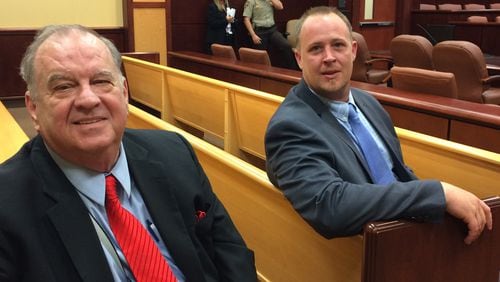A federal grand jury issued a subpoena this week in the case of a North Georgia newspaper publisher who was criminally charged and locked up after he asked for public documents relating to how local judges spent public money.
Brenda Weaver, chief judge of the Appalachian Judicial Circuit, sought the indictment of Fannin Focus publisher Mark Thomason and his attorney, Russell Stookey, in part because Thomason's open records request offended her. She prevailed upon the local district attorney, Alison Sosebee, to pursue and ultimately secure the indictments. (Weaver also chairs the state Judicial Qualifications Commission, which monitors the behavior of judges statewide.)
Weaver, a Superior Court judge, did not respond to inquiries from The Atlanta Journal-Constitution Wednesday on whether she has received a subpoena. People in a position to know about the federal investigation told the AJC that a subpoena served on District Attorney Sosebee asked her to turn over an investigative file relating to the affair.
The AJC also asked Sosebee whether she’d been served.
“I’m not comfortable answering that,” Sosebee said.
The U.S. Attorney’s Office in Atlanta and the FBI also declined to comment.
Weaver and Sosebee are at the center of a bizarre episode in which they sought to indict Thomason and his lawyer for the act of requesting public documents.
The dispute began when a Superior Court judge — a man who is no longer on the bench — used a racial slur in open court.
Thomason, the publisher, asked for a transcript of the remarks from the court reporter, Rhonda Stubblefield. Thomason said he was trying to verify news tips that others in the court also used the slur. But the transcript did not reflect that, and he asked Stubblefield to provide audiotapes of the proceeding. She refused, and Thomason sued her to secure the audio. Stubblefield countersued, for $1.6 million, saying Thomason had defamed her by questioning the accuracy of her work.
At length, Thomason’s suit was dismissed and Stubblefield dropped her countersuit. But Stubblefield had run up $15,691 in legal bills relating to the two suits. Although she is a private contractor — not a court employee — judges of the circuit saw fit to reimburse her for the expenses.
According to Weaver, the judges believed that paying Stubblefield’s legal expenses was the least they could do, since she had spent the money on lawsuits related to her duties of transcribing court testimony.
The federal investigation concerns that check for $15,691, which was drawn on the account assigned to Roger Bradley, also a Superior Court judge in the Appalachian Judicial Circuit, according to people familiar with the investigation. They requested anonymity because grand jury proceedings are secret.
Outside the circle of judges who presided in counties of the Appalachian Circuit — Fannin, Gilmer and Pickens — questions were raised about whether taxpayer dollars could be used to pay Stubblefield. The county attorney for Fannin, Lynn Doss, argued that the payment was a gratuity and violated the State Constitution. Rita Davis-Kirby, Fannin’s finance director and county clerk, wrote in an email to Weaver’s staff, “I’m not sure that’s something we can go along with since she is contract labor and not a county employee.”
The payment was made nevertheless.
Thomason and Stookey wanted to see a copy of the canceled check because Stubblefield had asked the court to order them to pay her legal expenses. They said they wanted to show that Stubblefield had already been reimbursed with taxpayer funds.
At the same time, Thomason was asking to see deposits and withdrawals from the account for Weaver’s office. The chief judge controls an office account of nearly $50,000 a year, which is contributed by taxpayers in the three counties of the circuit.
In the days before Thomason and Stookey were indicted, District Attorney Sosebee’s investigators gathered records, conducted recorded interviews and struggled to find a crime. What came out in those recorded interviews, which the AJC obtained under the Georgia Open Records Act, was a picture of small-town feuds and a judge pushing the DA she once mentored to bring criminal charges against those who had questioned the judge’s integrity.
“I don’t react well when my honesty is questioned,” Weaver had previously told the AJC.
Witness after witness on the recordings said there was no unusual activity regarding Weaver’s account.
“It’s a shame it’s got to this point,” investigator Greg Arp said during one of the interviews. “I don’t know that anything illegal has gone on.”
Despite the investigator's struggle to find a crime, Thomason and Stookey were indicted and jailed. Thomason was charged with making a false statement when he asked for copies of checks written on Weaver's office account that were "cashed illegally."
Thomason and Stookey also were charged with identity theft and attempted identity theft because they had secured a subpoena for a copy of the check written to Rhonda Stubblefield, the court reporter. (The charges were later dropped at Weaver's request, following a public outcry.)
Records show the chief judge was pushing for felony charges. But she says she stopped short of crafting the charging document.
“(I) did not see a copy of the indictment until after it had already been announced in open court,” Weaver said in an email to the AJC.
Records show she was deeply involved in the process leading up to the grand jury session. Weaver emailed several local officials with the details of her personal investigation. Her law clerk researched the law and then the judge forwarded the clerk’s findings to Sosebee.
Weaver proposed questions for Thomason and Stookey. The judge also sent Sosebee the names of people she should call before the grand jury and ask them “under oath” who had copies of checks that were eventually given to Thomason and Stookey; when did they have them; and how many times they had met to discuss “getting the Weavers.”
Sosebee said she did not acquiesce to the judge’s demands, and the grand jurors’ decision to indict was theirs alone. The emails only show that she and the judge communicated, Sosebee said.
“I don’t control what I receive.”






